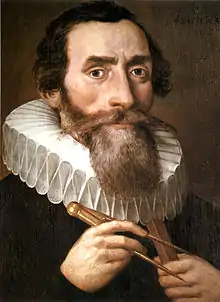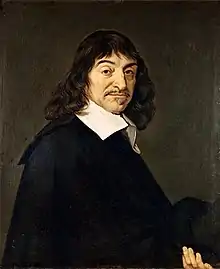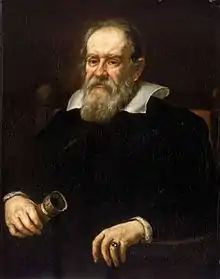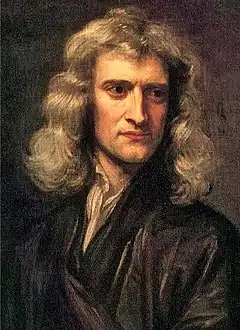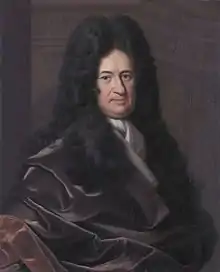17th century
The 17th century was the century that lasted from January 1, 1601, to December 31, 1700. The term is often used to refer to the 1600s, the century between January 1, 1600, and December 31, 1699. It falls into the Early Modern period of Europe and in that continent (whose impact on the world was increasing) was characterized by the Baroque cultural movement, the latter part of the Spanish Golden Age, the Dutch Golden Age, the French Grand Siècle dominated by Louis XIV, the Scientific Revolution, the world's first public company and megacorporation known as the Dutch East India Company, and according to some historians, the General Crisis. The greatest military conflicts were the Thirty Years' War,[1] the Great Turkish War, Mughal–Safavid Wars (Mughal–Safavid War (1622–23), Mughal–Safavid War (1649–53)), Anglo-Mughal Indian War, and the Dutch–Portuguese War. It was during this period also that European colonization of the Americas began in earnest, including the exploitation of the silver deposits, which resulted in bouts of inflation as wealth was drawn into Europe.[2]
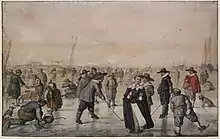


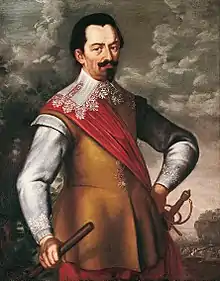
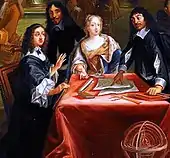
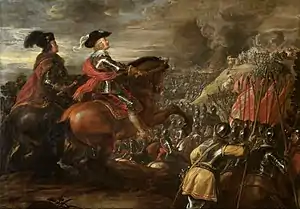
.jpeg.webp)
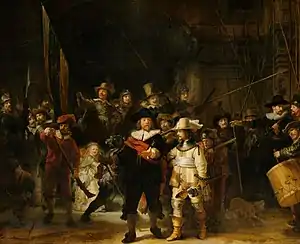
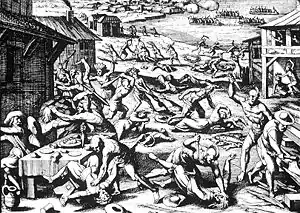
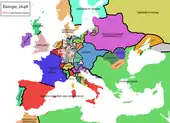
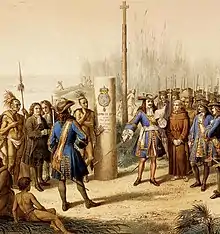

| Millennium: | 2nd millennium |
|---|---|
| Centuries: | |
| Timelines: | |
| State leaders: | |
| Decades: | |
| Categories: | Births – Deaths Establishments – Disestablishments |
In the Islamic world, the gunpowder empires – the Ottoman, Safavid and Mughal – grew in strength. Especially in the Indian subcontinent, Mughal architecture, culture and art reached its zenith, while the empire itself, during the sharia reign of Emperor Aurangzeb, is believed to have had the world's largest economy, bigger than the entirety of Western Europe and worth 25% of global GDP,[3] and its wealthiest province, the Bengal Subah signaled the period of proto-industrialization.[4]
In Japan, Tokugawa Ieyasu established the Tokugawa shogunate at the beginning of the century, beginning the Edo period; the isolationist Sakoku policy began in the 1630s and lasted until the 19th century. In China, the collapsing Ming dynasty was challenged by a series of conquests led by the Manchu warlord Nurhaci, which were consolidated by his son Hong Taiji and finally consummated by his grandson, the Shunzi Emperor, founder of the Qing dynasty.
From the middle decades of the 17th century, European politics were increasingly dominated by the Kingdom of France of Louis XIV, where royal power was solidified domestically in the civil war of the Fronde. The semi-feudal territorial French nobility was weakened and subjugated to the power of an absolute monarchy through the reinvention of the Palace of Versailles from a hunting lodge to a gilded prison, in which a greatly expanded royal court could be more easily kept under surveillance. With domestic peace assured, Louis XIV caused the borders of France to be expanded. It was during this century that English monarch became a symbolic figurehead and Parliament was the dominant force in government – a contrast to most of Europe, in particular France.
By the end of the century, Europeans were aware of logarithms, electricity, the telescope and microscope, calculus, universal gravitation, Newton's Laws of Motion, air pressure and calculating machines due to the work of the first scientists of the Scientific Revolution, including Galileo Galilei, Johannes Kepler, René Descartes, Pierre Fermat, Blaise Pascal, Robert Boyle, Christiaan Huygens, Antonie van Leeuwenhoek, Robert Hooke, Isaac Newton, and Gottfried Wilhelm Leibniz. It was also a period of development of culture in general (especially theater, music, visual arts and philosophy).
Events
1601–1650
- 1600: Michael the Brave unifies the three Romanian principalities: Wallachia, Moldavia and Translyvania after the Battle of Șelimbăr from 1599.
- 1601: Battle of Kinsale, England defeats Irish and Spanish forces at the town of Kinsale, driving the Gaelic aristocracy out of Ireland and destroying the Gaelic clan system.
- 1601–1603: The Russian famine of 1601–1603 kills perhaps one-third of Russia.
- 1602: Matteo Ricci produces the Map of the Myriad Countries of the World (坤輿萬國全圖, Kūnyú Wànguó Quántú), a world map that will be used throughout East Asia for centuries.
- 1602: The Dutch East India Company (VOC) is established by merging competing Dutch trading companies.[5] Its success contributes to the Dutch Golden Age.
- 1603: Elizabeth I of England dies and is succeeded by her cousin King James VI of Scotland, uniting the crowns of Scotland and England.
- 1603: Tokugawa Ieyasu takes the title of shōgun, establishing the Tokugawa shogunate. This begins the Edo period, which will last until 1868.
- 1605: The King of Gowa, a Makassarese kingdom in South Sulawesi, converts to Islam.
- 1606: The Long War between the Ottoman Empire and Austria is ended with the Peace of Zsitvatorok—Austria abandons Transylvania.
- 1606: Treaty of Vienna ends anti-Habsburg uprising in Royal Hungary.
- 1607: Flight of the Earls (the fleeing of most of the native Gaelic aristocracy) occurs from County Donegal in the west of Ulster in Ireland.
- 1607: Iskandar Muda becomes the Sultan of Aceh (r. 1607–1637). He will launch a series of naval conquests that will transform Aceh into a great power in the western Malay Archipelago.
- 1610: The Polish–Lithuanian Commonwealth army defeats combined Russian–Swedish forces at the Battle of Klushino and conquers Moscow.
- 1610: King Henry IV of France is assassinated by François Ravaillac.
- 1611: The Pontifical and Royal University of Santo Tomas, the oldest existing university in Asia, established by the Dominican Order in Manila[6]
- 1611: The first publication of the King James Bible.
- 1612: Cotswold Olympic Games, Robert Dover
- 1613: The Time of Troubles in Russia ends with the establishment of the House of Romanov, which rules until 1917.
- 1613–1617: Polish–Lithuanian Commonwealth is invaded by the Tatars dozens of times.[7]
- 1613: The Dutch East India Company is forced to evacuate Gresik because of the Mataram siege of neighboring Surabaya. The VOC enters into negotiations with Mataram and is allowed to set up a trading post in Jepara.
- 1614–1615: The Siege of Osaka (last major threat to Tokugawa shogunate) ends.
- 1616: The last remaining Moriscos (Moors who had nominally converted to Christianity) in Spain are expelled.
- 1616: English poet and playwright William Shakespeare dies.
- 1618: The Defenestration of Prague.
- 1618: The Bohemian Revolt precipitates the Thirty Years' War, which devastates Europe in the years 1618–48.
- 1618: The Manchus start invading China. Their conquest eventually topples the Ming dynasty.
- 1619: Dutch East India Company, English East India Company, and Sultanate of Banten all fighting over port city of Jayakarta. VOC forces storm the city and withstand a months-long siege by the combined English, Bantenese, and Jayakartan forces. They are relieved by Jan Pieterszoon Coen and a fleet of nineteen ships out of Ambon. Coen had burned Jepara and its EIC post along the way. The VOC levels the old city of Jayakarta and builds its new headquarters, Batavia, on top of it.
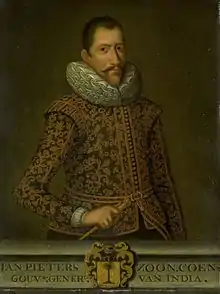
- 1620–1621: Polish-Ottoman War over Moldavia.
- 1620: Bethlen Gabor allies with the Ottomans and an invasion of Moldavia takes place. The Polish suffer a disaster at Cecora on the River Prut.
- 1620: The Mayflower sets sail from Plymouth, England to what became Plymouth Colony in the New England region of North America.
- 1621: The Battle of Chocim: Poles and Cossacks under Jan Karol Chodkiewicz defeat the Ottomans.
- 1622: Jamestown massacre: Algonquian natives kill 347 English settlers outside Jamestown, Virginia (one-third of the colony's population) and burn the Henricus settlement.
- 1624–1642: As chief minister, Cardinal Richelieu centralises power in France.
- 1626: St. Peter's Basilica in the Vatican completed.
- 1627: Aurochs go extinct.
- 1628—1629: Sultan Agung of Mataram launched a failed campaign to conquer Dutch Batavia.
- 1629: Abbas I, the Safavids king, died.
- 1629: Cardinal Richelieu allies with Swedish Protestant forces in the Thirty Years' War to counter Ferdinand II's expansion.
- 1630 : Birth of Chatrapati Shivaji Maharaj at Shivneri fort
- 1631: Mount Vesuvius erupts.
- 1632: Battle of Lützen, death of king of Sweden Gustav II Adolf.
- 1632: Taj Mahal building work started in Agra, India.
- 1633: Galileo Galilei arrives in Rome for his trial before the Inquisition.
- 1633–1639: Japan transforms into "locked country".
- 1634: Battle of Nördlingen results in Catholic victory.
- 1636: Harvard University is founded in Cambridge, Massachusetts.
- 1637: Shimabara Rebellion of Japanese Christians, rōnin and peasants against Edo.
- 1637: The first opera house, Teatro San Cassiano, opens in Venice.
- 1637: Qing dynasty attacked Joseon dynasty.
- 1639: Naval Battle of the Downs – Republic of the United Provinces fleet decisively defeats a Spanish fleet in English waters.
- 1639: Disagreements between the Farnese and Barberini Pope Urban VIII escalate into the Wars of Castro and last until 1649.
- 1639–1651: Wars of the Three Kingdoms, civil wars throughout Scotland, Ireland, and England.
- 1640–1668: The Portuguese Restoration War led to the end of the Iberian Union.
- 1641: The Irish Rebellion.
- 1641: René Descartes publishes Meditationes de prima philosophia Meditations on First Philosophy.
- 1642: Beginning of English Civil War, conflict will end in 1649 with the execution of King Charles I, abolishment of the monarchy and the establishment of the supremacy of Parliament over the king.
- 1643: L'incoronazione di Poppea, Monterverdi
- 1644: The Manchu conquer China ending the Ming dynasty. The subsequent Qing dynasty rules until 1912.
- 1644–1674: The Mauritanian Thirty-Year War.
- 1645–1669: Ottoman war with Venice. The Ottomans invade Crete and capture Canea.
- 1647–1652: The Great Plague of Seville.
- 1648: The Peace of Westphalia ends the Thirty Years' War and the Eighty Years' War and marks the ends of Spain and the Holy Roman Empire as major European powers.
- 1648–1653: Fronde civil war in France.
- 1648–1657: The Khmelnytsky Uprising – a Cossack rebellion in Ukraine which turned into a Ukrainian war of liberation from Poland.
- 1648–1667: The Deluge wars leave Polish–Lithuanian Commonwealth in ruins.
- 1648–1669: The Ottomans capture Crete from the Venetians after the Siege of Candia.
- 1649: King Charles I is executed for High treason, the first and only English king to be subjected to legal proceedings in a High Court of Justice and put to death.
- 1649–1653: The Cromwellian conquest of Ireland.
1651–1700
- 1651: English Civil War ends with the Parliamentarian victory at the Battle of Worcester.
- 1656–1661: Mehmed Köprülü is Grand Vizier.
- 1655–1661: The Northern Wars cement Sweden's rise as a Great Power.
- 1658: After his father Shah Jahan completes the Taj Mahal, his son Aurangzeb deposes him as ruler of the Mughal Empire.
- 1660: The Commonwealth of England ends and the monarchy is brought back during the English Restoration.
- 1661: The reign of the Kangxi Emperor of China begins.
- 1663: Ottoman war against Habsburg Hungary.
- 1663: Robert Hooke discovers cells using a microscope.
- 1664: The Battle of St. Gotthard: count Raimondo Montecuccoli defeats the Ottomans. The Peace of Vasvar – intended to keep the peace for 20 years.
- 1665: Portugal defeats the Kongo Empire at the Battle of Mbwila.
- 1665–1667: The Second Anglo-Dutch War fought between England and the United Provinces.
- 1666: The Great Fire of London.
- 1667: The Raid on the Medway during the Second Anglo-Dutch War.
- 1667–1668: The War of Devolution; France invades the Netherlands. The Peace of Aix-la-Chapelle (1668) brings this to a halt.
- 1667–1699: The Great Turkish War halts the Ottoman Empire's expansion into Europe.
- 1672–1673: Ottoman campaign to help the Ukrainian Cossacks. John Sobieski defeats the Ottomans at the second battle of Khotyn (1673).
- 1672–1674: The Third Anglo-Dutch War fought between England and the United Provinces
- 1672–1676: Polish–Ottoman War.
- 1672–1678: Franco-Dutch War.
- 1674: Shivaji forms the Maratha Empire, which lasts until 1818.
- 1676–1681: Russia and the Ottoman Empire commence the Russo-Turkish Wars.
- 1678: The Treaty of Nijmegen ends various interconnected wars among France, the Dutch Republic, Spain, Brandenburg, Sweden, Denmark, the Prince-Bishopric of Münster, and the Holy Roman Empire.

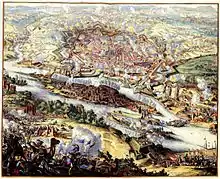
- 1680: The Pueblo Revolt drives the Spanish out of New Mexico until 1692.
- 1682: Chateau de Versailles, Saint-Gobain
- 1682 – In North America, the French explorer Robert La Salle claims all the land east of the Mississippi River.
- 1683: China conquers the Kingdom of Tungning and annexes Taiwan.
- 1683: The Ottoman Empire is defeated in the second Siege of Vienna.
- 1683–1699: The Great Turkish War leads to the conquest of most of Ottoman Hungary by the Habsburgs.
- 1687: Isaac Newton publishes Philosophiae Naturalis Principia Mathematica.
- 1688: The Siege of Derry.
- 1688: Siamese revolution of 1688 ousted French influence and virtually severed all ties with the West until the 19th century.
- 1688–1689: The Glorious Revolution starts with the Dutch Republic invading England, England becomes a constitutional monarchy.
- 1688–1691: The War of the Two Kings in Ireland.
- 1688–1697: The Grand Alliance sought to stop French expansion during the Nine Years' War.
- 1689: The Battle of Killiecrankie is fought between Jacobite and Williamite forces in Highland Perthshire.
- 1689: The Karposh rebellion is crushed in present-day North Macedonia, Skopje is retaken by the Ottoman Turks. Karposh is killed, and the rebels are defeated.
- 1689: Bill of Rights
- 1690: The Battle of the Boyne in Ireland.
- 1692: Port Royal in Jamaica is destroyed by an earthquake and tsunami, estimated 2000 die, 2300 are injured.
- 1692–1694: Famine in France kills 2 million.[8]
- 1693: The College of William and Mary is founded in Williamsburg, Virginia, by a royal charter.
- 1694: The Bank of England is established.
- 1695: The Mughal Empire nearly bans the East India Company in response to pirate Henry Every's capture of the Ganj-i-Sawai.
- 1696–1697: Famine in Finland wipes out almost one-third of the population.[9]
- 1697–1699: Grand Embassy of Peter the Great
- 1699: Thomas Savery demonstrates his first steam engine to the Royal Society.
Significant people
.jpg.webp)
Politics
- Abbas I of Persia, shah of the Safavid dynasty (1571–1629)
- Ahmed I, sultan of the Ottoman Empire (1590–1617)
- Alexis of Russia, tsar of Russia (1629–1676)
- Anne of Austria, queen consort and regent of France (1601–1666)
- Gustavus Adolphus, king of Sweden (1594–1632)
- Aurangzeb, Mughal emperor
- Bohdan Khmelnytsky, hetman of Cossacks (1595–1657)
- Gabriel Bethlen, Hungarian prince of Transylvania (1580–1629)
- Queen Christina of Sweden, high-profile Catholic convert, matron of the arts (1626–1689)
- Charles I of England (1600–1649)
- Charles II of England (1630–1685)
- Charles II of Spain (1661–1700)
- Jean-Baptiste Colbert, chief minister of Louis XIV of France
- Oliver Cromwell, Lord Protector of England, Scotland and Ireland (1599–1658)
- Richard Cromwell, Lord Protector of England, Scotland and Ireland (1626–1712)
- Henry IV of France (1553–1610)
- Tokugawa Ieyasu, the founder of the Tokugawa shogunate in Japan (1543–1616)
- Jahangir, Mughal emperor
- James I of England (1566–1625)
- James II of England (1633–1701)
- Kangxi Emperor, ruler of China
- Leopold I, Holy Roman Emperor (1640–1705)
- Louis XIII of France, King of France (1601–1643)
- Louis XIV of France, King of France (1638–1715)
- Marie de' Medici, regent of France (1575–1642)
- Mary II of England (1662–1694)
- Cardinal Mazarin, French prime minister of Italian origin (1602–1661)
- Mehmed IV, sultan of the Ottoman Empire
- Murad IV, sultan of the Ottoman Empire
- Peter the Great, first Russian emperor (1672–1725)
- Philip III of Spain, Spanish king (1578–1621)
- Philip IV of Spain, Spanish king (1605–1665)
- Dmitry Pozharsky, Russian prince, leader of anti-Polish uprising (1577–1642)
- Cardinal Richelieu, French prime minister (1585–1642)
- Gaspar de Guzmán, Count-Duke of Olivares, Spanish prime minister
- Michael of Russia, tsar of Russia (1596–1645)
- Shah Jahan, Mughal emperor
- Shivaji, emperor of the Maratha Empire (1674–1680)
- Jan III Sobieski, military leader and king of Poland (1629–1696)
- Imre Thököly, leader of the anti-Habsburg uprising in Hungary (1657–1705)
- Henri de Turenne, Marshal General of France (1611–1675)
- Albrecht von Wallenstein, Catholic German general and statesman in the Thirty Years' War (1583–1634)
- William III of England, stadthouder of the main provinces of the Republic of the United Provinces and King of England (1650–17027)
- Johan de Witt, Grand Pensionary of the Republic of the United Provinces (1625–1672)
Consorts of Rulers (and lovers)
- Françoise-Athénaïs, marquise de Montespan, lover of Louis XIV (1641–1707)
- Françoise d'Aubigné, Marquise de Maintenon, wife of Louis XIV (1635–1719)
- Maria Theresa of Spain, queen consort of France
Military
- Louis de Bourbon, prince of Condé, French general(1621–1686)
- Michiel de Ruyter, Dutch admiral (1607–1676)
- Johann Tserclaes, Count of Tilly, Catholic general in the Thirty Years' War (1559–1632)
Relatives of political figures
- Philippe I, Duke of Orleans, younger son of Louis XIII of France and his wife, Anne of Austria. His older brother was the "Sun King", Louis XIV. He is also ancestor of many European monarchs
Religious Leader
- Guru Teg Bahadur, 9th Sikh Guru (1621–1675)
Musicians
- Johann Christoph Bach, Composer and great-uncle of J.S. Bach, (1642–1703)
- John Blow, English composer (1649–1708)
- Dieterich Buxtehude, Danish-German composer
- Francesco Cavalli, Venetian opera composer (1602–1676)
- Marc-Antoine Charpentier, French composer (1643–1708)
- Arcangelo Corelli, Italian composer (1653–1713)
- Jean-Baptiste Lully, Italian-born composer regarded as the father of French opera (1632–1687)
- Claudio Monteverdi, the most prominent composer of his time and creator of Baroque (1567–1643)
- Johann Pachelbel, German composer (1653–1706)
- Henry Purcell, English composer (1659–1695)
- Alessandro Scarlatti, Italian opera composer (1660–1725)
- Heinrich Schütz, German composer (1585–1672)
Visual artists
- Gian Lorenzo Bernini, Italian sculptor and architect (1598–1680)
- Francesco Borromini, Italian architect (1599–1667)
- Michelangelo Merisi da Caravaggio, Italian painter (1571–1610)
- Anthony van Dyck, Flemish painter (1599–1641)
- Artemisia Gentileschi, Italian painter (1593 – c. 1656)
- Frans Hals, Dutch painter (1580–1666)
- Georges de La Tour, French painter (1593–1652)
- Charles Le Brun, painter of Louis XIV
- André Le Nôtre, French landscape architect (1613–1700)
- Bartolomé Esteban Murillo, Spanish painter (1617–1682)
- Nicolas Poussin, French painter (1594–1665)
- Guido Reni, Italian painter
- José de Ribera, Lo Spagnoletto (1591–1652)
- Rembrandt van Rijn, Dutch painter (1606–1669)
- Peter Paul Rubens, Flemish painter, 1577–1640
- Jan Steen, Dutch painter (1626–1679)
- Diego Rodríguez de Silva y Velázquez, Spanish painter (1599–1660)
- Vauban, French military architect
- Johannes Vermeer, Dutch painter (1632–1675)
- Christopher Wren, English architect
- Francisco de Zurbarán, Spanish painter (1598–1664)
Literature
- Nicolas Boileau-Despréaux, French poet and critic (1636–1711)
- John Bunyan, author of The Pilgrim's Progress (1628–1688)
- Pedro Calderón de la Barca, Spanish dramatist (1600–1681)
- Miguel de Cervantes Saavedra, Spanish novelist (1574–1616)
- Pierre Corneille, French dramatist (1606–1684)
- Cyrano de Bergerac, French playwright and novelist (1619–1655)
- John Donne, English metaphysical poet (1572–1631)
- John Dryden, English poet (1631–1700)
- Jean de La Fontaine, French poet (1621–1695)
- Luis de Góngora, Spanish poet (1561–1627)
- Juana Inés de la Cruz, Mexican poet (1651–1695)
- Ben Jonson, English dramatist (1572–1637)
- Matsuo Bashō, the first author of haiku (1644–1694)
- François de La Rochefoucauld, French author (1613–1680)
- John Milton, English author and poet (1608–1674)
- Molière, French dramatist (1622–1673)
- Tirso de Molina, Spanish dramatist (1579–1648)
- Miyamoto Musashi, Japanese samurai and author (1584–1645)
- Samuel Pepys, English civil servant and diarist (1633–1703)
- Charles Perrault, French author of fairy tales (1628–1703)
- Francisco de Quevedo, Spanish writer (1580–1645)
- Jean Racine, French dramatist (1639–1699)
- William Shakespeare, English playwright (1564–1616)
- Félix Lope de Vega, Spanish playwright (1562–1635)
Explorers
- William Baffin, English navigator in Northwest Passage
- Evliya Çelebi, Ottoman traveler
- Samuel de Champlain, French founder of Canada
- Semyon Dezhnyov (1605–1672), Russian explorer of Siberia
- Henry Hudson (1565–1611), English navigator of North America
- René-Robert Cavelier, Sieur de La Salle, French explorer of Mississippi
- Matteo Ricci, Italian missionary in China
- Abel Janszoon Tasman (1603–1659), Dutch seafarer of Australia
- Luis Váez de Torres (c. 1565–1607), Spanish explorer of the Pacific
Science and philosophy
- Antonie van Leeuwenhoek, Dutch biologist
- Athanasius Kircher, German polymath
- Baruch Spinoza, Dutch philosopher (1632–1677)
- Blaise Pascal, French mathematician and philosopher (1623–1662)
- Christiaan Huygens, Dutch inventor, physicist and astronomer (1629–1695)
- Edmond Halley, English astronomer
- Evangelista Torricelli, Italian physicist and mathematician
- Francis Bacon, English methodologist and politician (1561–1626)
- Francis de Sales, doctor of the Church
- Galileo Galilei, Italian astronomer (1564–1642)
- Giovanni Cassini, Italian-French astronomer
- Gottfried Leibniz, German philosopher and mathematician (1646–1716)
- Hugo Grotius, Dutch political scientist
- Isaac Newton, English physicist, mathematician and philosopher (1643–1727)
- Jacques-Bénigne Bossuet, French theologian
- Jacob Bernoulli, Swiss mathematician
- Johannes Amos Comenius, Czech educationist
- Johannes Kepler, German astronomer (1571–1630)
- John Locke, English philosopher (1632–1704)
- John Napier, Scottish inventor of the logarithms (1550–1617)
- Margaret Mary Alacoque, French mystic
- Marin Mersenne, (1588–1648), French polymath
- Ole Rømer, Danish astronomer (1644–1710)
- Otto von Guericke, German inventor (1602–1686)
- Pierre Bayle, French freethinker
- Pierre de Fermat, French mathematician (1601–1665)
- Pierre Gassendi, French philosopher
- René Descartes, French philosopher and mathematician (1596–1650)
- Robert Boyle, the founder of chemistry
- Robert Hooke, English biologist and physicist (1635–1703)
- Thomas Hobbes, English philosopher (1588–1679)
- Tommaso Campanella, Italian philosopher
- William Harvey, English biologist (1578–1657)
Inventions, discoveries, introductions
Major changes in philosophy and science take place, often characterized as the Scientific revolution.
- Banknotes reintroduced in Europe.
- Ice cream.
- Tea and coffee become popular in Europe.
- Central Banking in France and modern Finance by Scottish economist John Law.
- Minarets, Jamé Mosque of Isfahan, Isfahan, Persia (Iran), are built.
- 1604: Supernova SN 1604 is observed in the Milky Way.
- 1605: Johannes Kepler starts investigating elliptical orbits of planets.
- 1605: Johann Carolus of Germany publishes the 'Relation', the first newspaper.
- 1608: Refracting telescope's first appear. Dutch spectacle-maker Hans Lippershey tries to obtain a patent on one spreading word of the invention.
- 1610: The Orion Nebula is identified by Nicolas-Claude Fabri de Peiresc of France.
- 1610: Galileo Galilei and Simon Marius observe Jupiter's Galilean moons.
- 1611: King James Bible or 'Authorized Version' first published.
- 1612: The first flintlock musket likely created for Louis XIII of France by gunsmith Marin Bourgeois.
- 1614: John Napier introduces the logarithm to simplify calculations.
- 1616: Niccolò Zucchi describes experiments with a bronze parabolic mirror trying to make a reflecting telescope.
- 1620: Cornelis Drebbel, funded by James I of England, builds the first 'submarine' made of wood and greased leather.
- 1623: The first English dictionary, 'English Dictionarie' is published by Henry Cockeram, listing difficult words with definitions.
- 1628: William Harvey publishes and elucidates his earlier discovery of the circulatory system.
- 1637: Dutch Bible published.
- 1637: Teatro San Cassiano, the first public opera house, opened in Venice.
- 1637: Pierre de Fermat formulates his so-called Last Theorem, unsolved until 1995.
- 1637: Although Chinese naval mines were earlier described in the 14th century Huolongjing, the Tian Gong Kai Wu book of Ming dynasty scholar Song Yingxing describes naval mines wrapped in a lacquer bag and ignited by an ambusher pulling a rip cord on the nearby shore that triggers a steel-wheel flint mechanism.
- 1642: Blaise Pascal invents the mechanical calculator called Pascal's calculator.
- 1642: Mezzotint engraving introduces grey tones to printed images.
- 1643: Evangelista Torricelli of Italy invents the mercury barometer.
- 1645: Giacomo Torelli of Venice, Italy invents the first rotating stage.
- 1651: Giovanni Riccioli renames the lunar maria.
- 1656: Christiaan Huygens describes the true shape of the rings of Saturn.
- 1657: Christiaan Huygens develops the first functional pendulum clock based on the learnings of Galileo Galilei.
- 1659: Christiaan Huygens first to observe surface details of Mars.
- 1662: Christopher Merret presents first paper on the production of sparkling wine.
- 1663: James Gregory publishes designs for a reflecting telescope.
- 1669: The first known operational reflecting telescope is built by Isaac Newton.
- 1676: Antonie van Leeuwenhoek discovers Bacteria.
- 1676: First measurement of the speed of light.
- 1679: Binary system developed by Gottfried Wilhelm Leibniz.
- 1684: Calculus independently developed by both Gottfried Wilhelm Leibniz and Sir Isaac Newton and used to formulate classical mechanics.
References
- "The Thirty-Years-War". Western New England College. Archived from the original on 1999-10-09. Retrieved 2008-05-24.
- "The Seventeenth-Century Decline". The Library of Iberian resources online. Retrieved 13 August 2008.
- Maddison, Angus (2003): Development Centre Studies The World Economy Historical Statistics: Historical Statistics, OECD Publishing, ISBN 9264104143, pages 259–261
- Lex Heerma van Voss; Els Hiemstra-Kuperus; Elise van Nederveen Meerkerk (2010). "The Long Globalization and Textile Producers in India". The Ashgate Companion to the History of Textile Workers, 1650–2000. Ashgate Publishing. p. 255.
- Ricklefs (1991), page 28
- History of UST UST.edu.ph. Retrieved December 21, 2008.
- "The Tatar Khanate of Crimea". Archived from the original on 2016-03-23. Retrieved 2008-06-05.
- Alan Macfarlane (1997). The savage wars of peace: England, Japan and the Malthusian trap. Wiley . p. 64. ISBN 0-631-18117-2
- Karen J. Cullen (2010). "Famine in Scotland: The 'Ill Years' of the 1690s". Edinburgh University Press. p. 20. ISBN 0-7486-3887-3
Further reading
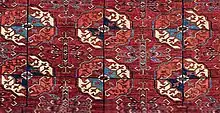
- Chang, Chun-shu, and Shelley Hsueh-lun Chang. Crisis and Transformation in Seventeenth-Century China" (1998).
- Reid, A. J. S. Trade and State Power in 16th & 17th Century Southeast Asia (1977).
- Spence, J. D. The Death of Woman Wang: Rural Life in China in the 17th Century (1978).
Focus on Europe
- Clark, George. The Seventeenth Century (2nd ed. 1945).
- Hampshire, Stuart. The Age of Reason the 17th Century Philosophers, Selected, with Introduction and Interpretive Commentary (1961).
- Lewitter, Lucian Ryszard. "Poland, the Ukraine and Russia in the 17th Century." The Slavonic and East European Review (1948): 157–171. in JSTOR
- Ogg, David. Europe in the Seventeenth Century (6th ed. 1965).
- Rowbotham, Sheila. Hidden from history: Rediscovering women in history from the 17th century to the present (1976).
- Trevor-Roper, Hugh R. "The general crisis of the 17th century." Past & Present 16 (1959): 31–64.
External links
| Wikimedia Commons has media related to 17th century. |
- Vistorica: Timelines of 17th century events, science, culture and persons
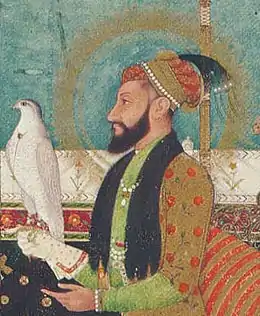
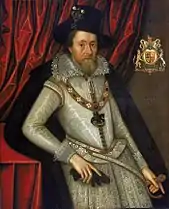

.jpg.webp)
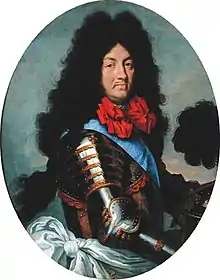
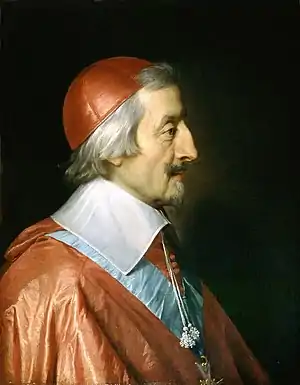
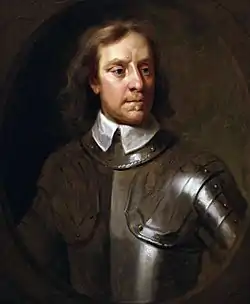
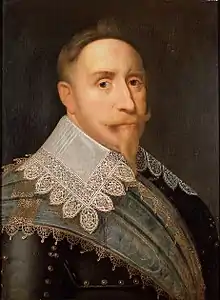
.jpg.webp)
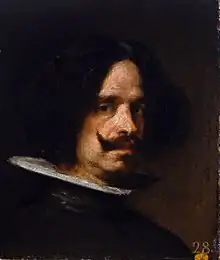
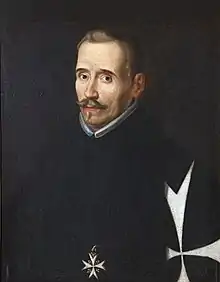
.jpg.webp)
